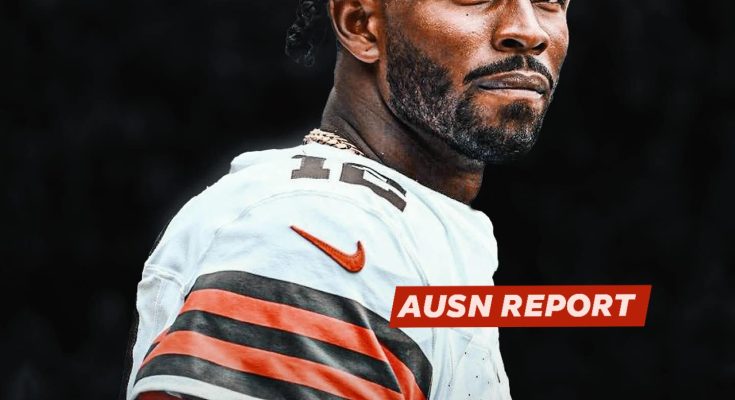The Cleveland Browns made headlines in the offseason when they used a fifth-round pick on quarterback Shedeur Sanders, the son of NFL legend and Colorado head coach Deion Sanders. With plenty of name recognition and an intriguing college career behind him, Shedeur was one of the most talked-about mid-round quarterback prospects in the 2025 NFL Draft. Expectations were varied—some saw him as a developmental project who could eventually become a serviceable starter or high-end backup, while others believed his name carried him higher than his actual NFL readiness. Fast forward to the start of his rookie season, and the conversation surrounding Shedeur has taken a concerning turn. According to ESPN Cleveland’s Tony Rizzo, Sanders isn’t just low on the depth chart—he isn’t getting any practice reps at all. Not first-team, not second-team, not even on the scout team. Instead, Bailey Zappe, a journeyman backup quarterback with some NFL starting experience, is taking all the scout team reps, leaving Sanders to essentially watch from the sidelines.
Rizzo’s comments cut to the heart of the matter in blunt fashion: “I’m hearing Shedeur isn’t even running scout team, he’s literally watching everyone. Bailey Zappe is running scout team… that’s what I’m hearing. Why is he on the team? Why is he even here?” That kind of sentiment, especially so early in Sanders’s NFL journey, raises red flags about how the Browns view him internally. If a rookie quarterback is being sidelined to the point where he isn’t even simulating opposing offenses in practice, it raises the question of whether Cleveland drafted him with a true plan in mind, or if this was a pick driven by intrigue rather than need.
The situation becomes more complex when viewed through the lens of the Browns’ current quarterback room. Deshaun Watson remains the starter, the centerpiece of the franchise’s future, albeit a player still surrounded by questions about performance, health, and consistency. Behind him are veterans who serve a clear purpose: a steady hand in case of injury, and someone who can handle the scout team role to prepare the defense each week. That’s where Zappe has carved his niche. He’s experienced enough to run opposing offenses in practice, and he has actual NFL starts under his belt from his time with the New England Patriots. In contrast, Sanders is a rookie with no professional experience, and perhaps the coaching staff feels he simply isn’t ready to handle the speed or complexity of running a scout team effectively.
Still, for a fifth-round draft pick, the expectation is usually at least some level of developmental opportunity. NFL teams rarely waste draft capital, even in the later rounds, unless they see potential to cultivate. For Sanders to not be given even those basic opportunities in practice is troubling. Normally, rookie quarterbacks at least cycle through scout team duties, learning the rhythms of practice and the tempo of an NFL defense, even if they’re not expected to contribute on game days. To be sidelined entirely suggests either a significant gap between Sanders’s readiness and the coaching staff’s expectations or a lack of investment in his long-term future.
This scenario also raises questions about the decision-making process in the Browns’ front office. Was Sanders drafted because the Browns truly believed he could develop into a valuable asset? Or was his selection influenced by the marketing appeal of being Deion Sanders’s son? While NFL teams don’t typically draft players solely for name value, the Sanders brand is undeniably strong, and attaching the Browns’ future to a player with that kind of notoriety can bring both excitement and scrutiny. If the team did not have a clear developmental plan for him, then the pick looks questionable in hindsight, especially if he’s not even being utilized in practice situations.
From Sanders’s perspective, this situation is less than ideal. A rookie year is critical for development, particularly in terms of adjusting to NFL speed, mastering the playbook, and learning the professional routine. Reps are essential, even if they’re just in practice or scout team drills. Without those opportunities, a quarterback risks stagnation, left with only mental reps and film study to improve. While watching and learning from veterans can be beneficial, nothing replaces live reps. If Sanders spends an entire season on the sidelines without touching the field in practice, his trajectory could be stunted before it even begins.
Fans have already begun voicing frustration, with some echoing Rizzo’s sentiment: why is Shedeur Sanders on the team if he’s not going to play any role at all? NFL rosters are too valuable to waste, and even developmental projects usually show some path toward eventual contributions. Cleveland could have used that pick to bolster depth elsewhere, and instead, they have a high-profile rookie quarterback essentially functioning as an observer. That perception doesn’t sit well with those who wanted to see Sanders given a chance to prove himself.
The coaching staff, led by Kevin Stefanski, will likely push back on the narrative, pointing out that player development isn’t always linear and that some rookies take longer to adjust. The Browns may simply want Sanders to focus on learning the playbook and adjusting mentally to the NFL without the pressure of practice reps he isn’t ready for. It’s possible they view 2025 as a redshirt year, with the intent of gradually working him into reps in future seasons. While that logic has merit, the optics are still poor, especially given the national attention Sanders carries.
The comparisons to Zappe also highlight the difference in how teams value experience. Zappe, while not a star, has proven he can step in when needed. Sanders, by contrast, is untested. Coaches tasked with preparing a defense for Sunday games will naturally lean toward the quarterback who can give them a more accurate look in practice. That practicality, however, doesn’t ease the concern that Sanders is being left behind in his development.
Looking historically, the NFL has seen quarterbacks drafted in the middle or late rounds succeed, but almost all of them were at least given practice reps early on. Tom Brady famously started as a backup, but he ran scout team drills and learned by doing. Dak Prescott was given reps when injuries forced Dallas’s hand, but his path was paved by opportunities in practice. Even quarterbacks who never became stars, like Gardner Minshew or Taylor Heinicke, at least touched the field in practice situations early in their careers. Sanders’s situation feels different, almost as if the Browns are treating him as a non-factor from the jump.
One angle worth considering is whether this is more about the Browns’ current competitive timeline than Sanders himself. Cleveland believes it can contend in the AFC North, and in such a competitive division, every practice rep matters. The coaching staff may feel they don’t have the luxury of experimenting with a raw rookie on scout team when Zappe can better simulate opposing quarterbacks and challenge the defense in preparation. If that’s the case, Sanders may be a casualty of circumstance, sacrificed for the team’s immediate goals rather than long-term planning.
For Sanders, the best path forward may be patience and persistence. If he truly isn’t getting reps, he’ll need to maximize film study, one-on-one coaching, and whatever opportunities he can seize. His NFL journey isn’t over before it begins, but he’ll need to prove in the offseason or preseason that he belongs in the rotation, at least in practice. If he can’t, questions will linger about his future in Cleveland and whether he’d be better off seeking a fresh start elsewhere.
The reaction around the league to this development will also be telling. Other teams are certainly watching, and if Sanders’s situation doesn’t improve, it wouldn’t be shocking to see rumors about a potential trade or release down the line. In a league where backup quarterbacks are always in demand, his name recognition alone might earn him another shot elsewhere, even if Cleveland decides he isn’t part of their long-term plan.
Ultimately, the Shedeur Sanders saga in Cleveland highlights the delicate balance between drafting for potential and having a concrete developmental plan. Right now, it looks like the Browns invested in a player without mapping out how he would grow in their system. For Sanders, it’s a frustrating start, one that leaves him on the outside looking in during practices that should be formative for his career. For the Browns, it’s a situation that invites criticism, especially if other mid-round rookies around the league start flashing while Sanders remains stuck on the sideline.
As of now, the narrative is clear: a fifth-round rookie quarterback with a famous last name isn’t getting the opportunities that most expected, and it has raised eyebrows both locally and nationally. Whether this is simply a slow developmental approach or a sign that the Browns don’t truly see him as part of their future remains to be seen. But one thing is certain—the pressure and scrutiny surrounding Shedeur Sanders aren’t going anywhere, and every week he spends without taking a snap in practice will only intensify the questions about why he’s on the team in the first place.



